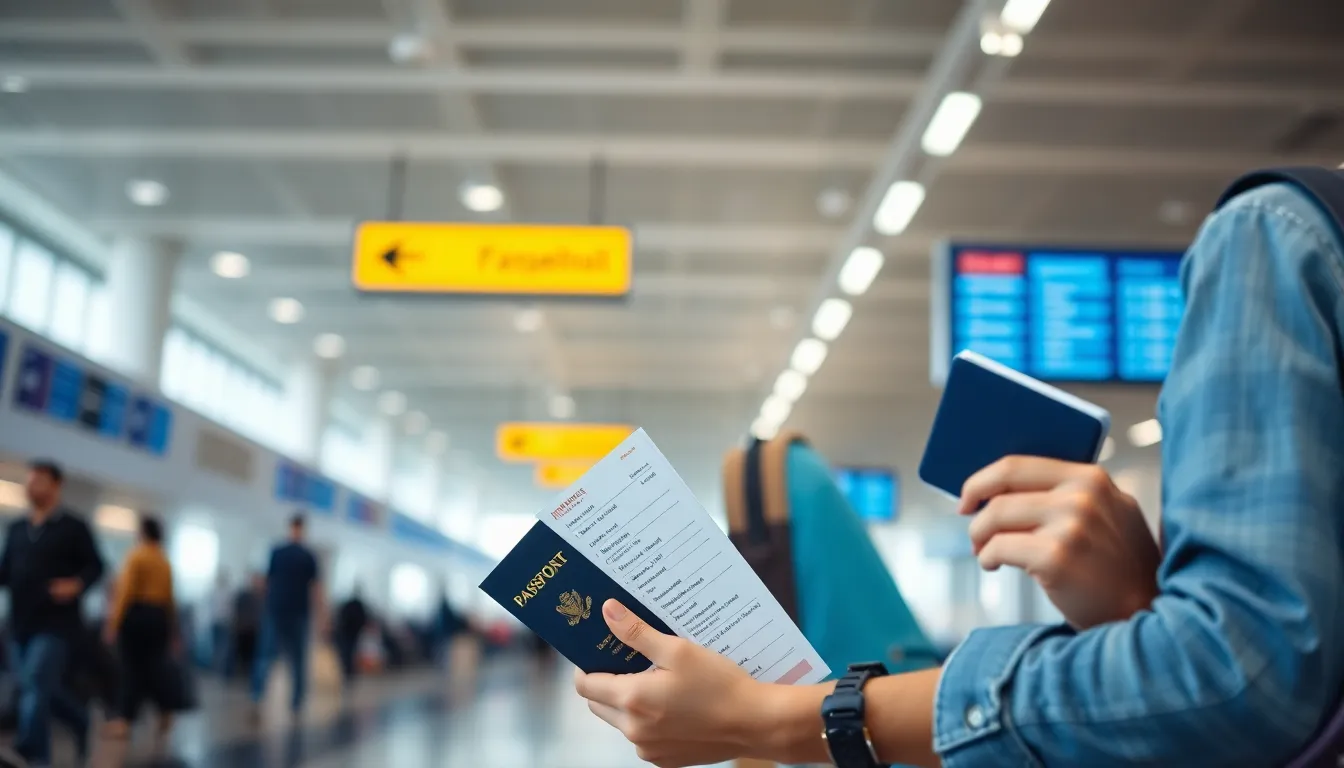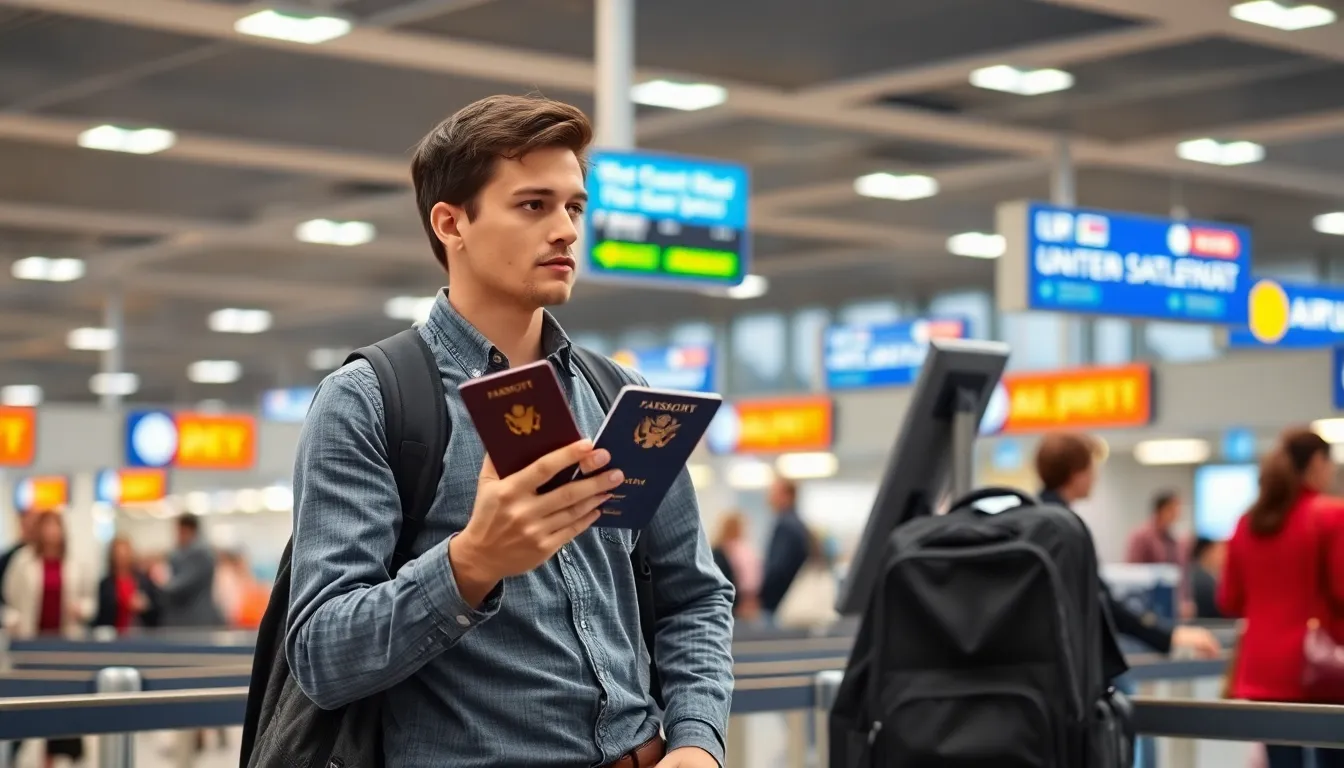In the fast-paced world of travel, keeping your documents up to date is as crucial as packing your favorite socks. Imagine arriving at the airport only to realize your passport expired last month—talk about a vacation buzzkill! With new regulations popping up faster than you can say “boarding pass,” staying informed about travel document updates can save you from a world of hassle.
Table of Contents
ToggleOverview of Travel Documents Updates
Travel documents require regular updates to maintain validity. Passports, visas, and other essential documents can have specific expiration dates. Renewing these documents ahead of time prevents complications during travel. Informed travelers recognize the latest regulations for documentation. For instance, many countries have adopted stricter entry requirements due to health crises, making it necessary to check the latest travel advisories.
Various travel documents include a passport, visa, and identification cards. Each document serves distinct purposes. A passport proves identity and citizenship, while a visa grants entry to a specific country. Identification cards, such as a driver’s license, help identify travelers during domestic trips.
Travelers should verify expiration dates before planning trips. Some airlines require passports to be valid for at least six months beyond the intended departure. Remaining aware of these requirements eliminates last-minute surprises at the airport.
Government websites often offer the most accurate information on travel document updates. Changes can occur rapidly, affecting travel plans significantly. For example, the U.S. Department of State provides up-to-date information on passport renewal processes.
Maintaining accurate contact information ensures that authorities notify travelers of important updates. This proactive approach facilitates smoother travel experiences. Always keep copies of travel documents as a backup in case of loss or theft. Organizing documents in advance streamlines the travel process.
Importance of Staying Updated

Staying updated on travel documents significantly reduces complications during travel. Notably, changes in regulations can happen frequently, impacting visa requirements.
Changes in Visa Regulations
Government authorities may modify visa regulations unexpectedly. Travelers should always check specific entry requirements for their destination. Some countries may implement new health regulations that could affect entry. Additionally, the processing times for visas can fluctuate, impacting travel plans. Interested travelers should consult official government resources or travel advisories for the latest information. Not verifying visa updates may lead to denied entry or unexpected delays at the airport. Different countries may also have varying requirements for transit visas. Staying informed empowers travelers to adapt their plans accordingly.
Passport Renewal Processes
Renewing passports is essential for smooth travel experiences. Keeping track of expiration dates ensures no last-minute surprises. Many countries require passports to be valid for at least six months past the planned return date. Travelers should apply for a renewal well ahead of their travel date to avoid any issues. Typical processing times can vary from weeks to months, depending on the country. Expedited options are available, yet they may incur additional fees. It’s advisable to gather all necessary documents before initiating the renewal process. Finally, checking for any specific identification requirements for renewal ensures compliance with local regulations.
Recent Developments in Travel Policies
Travel policies have evolved significantly in recent years, influenced by various global events. Keeping travel documents updated remains crucial to complying with regulations.
Impact of COVID-19 on Travel Documentation
COVID-19 drastically changed travel documentation. Many countries introduced specific health requirements, such as vaccination certificates or negative test results, for entry. Travelers must provide both their passports and health documents to meet current regulations. Some airlines also enforce additional guidelines, leading to increased verification demands. Countries continuously update their entry policies in response to the pandemic, contributing to fluctuations in document requirements. It’s essential for travelers to stay informed about these changes to minimize risks related to denied entry or unanticipated restrictions.
New Technologies in Document Verification
Technology advancements have enhanced document verification processes. Biometric systems, such as facial recognition, streamline airport check-ins and reduce human error. Additionally, blockchain technology offers secure verification methods, making it harder to forge travel documents. Digital passport options are being explored by various countries, allowing for more efficient processing. Automated document scanners can quickly verify the authenticity of visas and identification cards at checkpoints. Overall, these technological innovations positively impact the efficiency of travel while ensuring compliance with stringent verification standards.
Best Practices for Keeping Travel Documents Current
Keeping travel documents up to date ensures a smooth travel experience. Travelers must regularly check expiration dates for passports, visas, and identification cards. Many countries require passports to remain valid for at least six months beyond the planned return date. Verifying these details before departure significantly reduces last-minute complications.
Staying informed about visa regulations is essential, as these can change frequently. Travelers should check specific entry requirements for each destination, especially due to evolving health regulations. A proactive approach helps avoid denied entry or unexpected delays. Gathering necessary documents well ahead of travel simplifies the renewal process.
Maintaining accurate contact information enhances the ability to receive important updates from authorities. Organizing all travel documents in a secure location also streamlines preparation. Travelers can keep copies of their documents as backups, particularly for essential items like passports and visas.
Monitoring advancements in travel policies, especially post-COVID-19, allows travelers to adapt quickly to new health requirements. Issues such as vaccination certificates and negative test results now play a critical role in entry procedures. Many airlines and border control agencies enforce these demands strictly.
Embracing technology can aid in ensuring document compliance. Biometric systems and automated document scanners improve verification processes at checkpoints. Digital passport options and blockchain technology offer innovative solutions for secure travel documentation. Overall, prioritizing these practices leads to an efficient and secure travel journey.
Conclusions
Keeping travel documents up to date is essential for a hassle-free journey. Travelers must remain vigilant about expiration dates and evolving regulations to avoid complications at borders. With the increasing complexity of entry requirements due to health crises and technological advancements, staying informed is crucial.
Organizing documents and maintaining accurate contact information can make a significant difference. Embracing new technologies like biometric systems can enhance compliance and streamline the travel experience. By prioritizing these practices, travelers can navigate the complexities of modern travel with confidence and ease.





